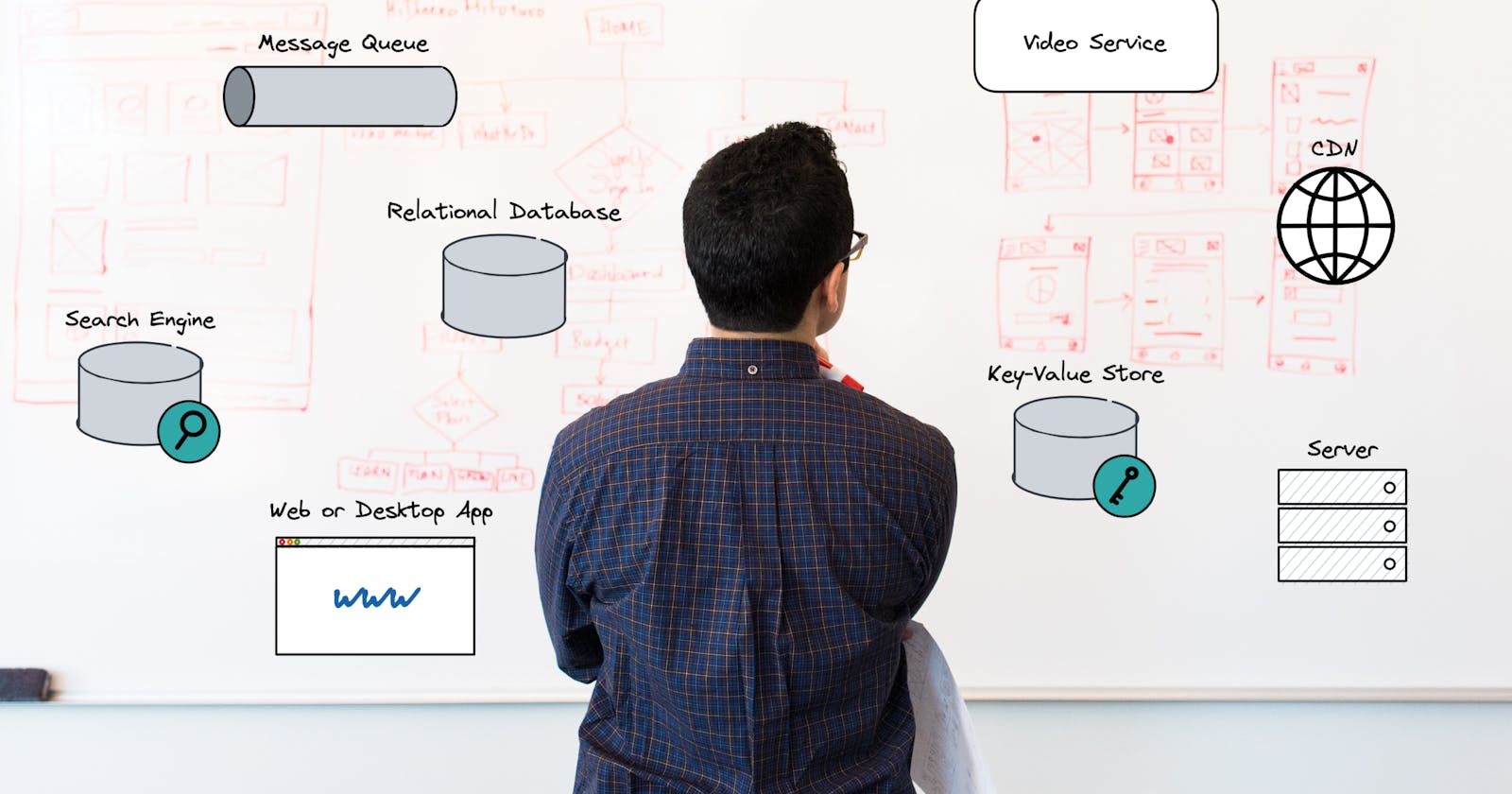The last Crash Course in System Design Interview Prep you ever need!
A comprehensive guide to structure your interview preparation. Take the quiz to receive a tailored prep roadmap, and ace your interview! 🚀
Table of contents
Getting ready for upcoming technical interviews and curious about the system design component? Gaining a clear understanding of what is expected of you and how to adequately prepare is the first essential step towards success.
This article aims to equip you with a solid understanding of the fundamental elements that should influence your interview preparation strategy, all tailored to your unique needs and career objectives.
Regardless of your role — be it a software engineer, engineering manager, or product manager, and irrespective of your experience level — from seasoned professionals to recent boot camp graduates, this information is relevant and beneficial.
Short on time? You can also shortcut and just take the following quiz to determine whether you’re likely to encounter a system design interview and, if so, suggest the most effective preparation strategy considering your background and the companies you’re interested in.

👉 Take the quiz to find out if the system interview applies to you.
Let’s dive into the knowledge and strategies required to ace technical interviews, possibly bringing you a step closer to your career goals. Are you ready to start? Let’s unveil the secrets to achieving interview success.
The sheer volume of knowledge required for mastering the system design interview can feel overwhelming.
What’s the System Design Interview?
Let’s start with a concise overview on what system design interviews are and what companies how to get out of them.
In a system design interview, candidates are presented with the challenge of designing scalable and efficient solutions for intricate real-world problems.
This kind of interview extends beyond mere coding proficiency, as it seeks to assess a candidate’s ability to architect robust systems, make critical design decisions, and effectively navigate trade-offs. During the interview, candidates are expected to showcase their comprehension of system components, data structures, algorithms, as well as their expertise in designing distributed systems, databases, APIs, and more.
Ultimately, this assessment aims to gauge the candidate’s prowess in analytical thinking, problem-solving skills, and capacity to devise solutions that align with performance, scalability, and reliability requirements.
The Fundamental Challenge
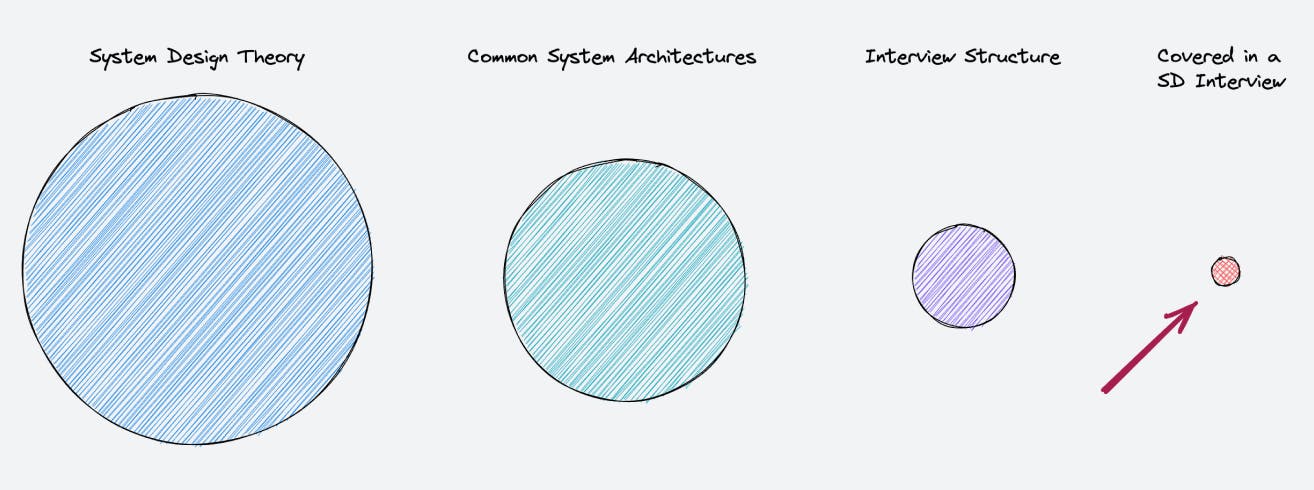
The sheer volume of knowledge required for mastering the system design interview can feel overwhelming.
The challenge lies in the fact that within a 45-minute system design interview may only a small fraction of the content you study extensively will be assessed. Therefore, it is crucial to develop a targeted system design interview preparation strategy that focuses on the most relevant and likely content for you.
The coverage of topics in these interviews varies based on factors such as your experience level, role and the tier of the companies you interview with. To navigate this intricate landscape successfully, let's explore these aspects in more depth and devise a tailored approach to ensure your readiness.
The Impact of Seniority & Company Tier
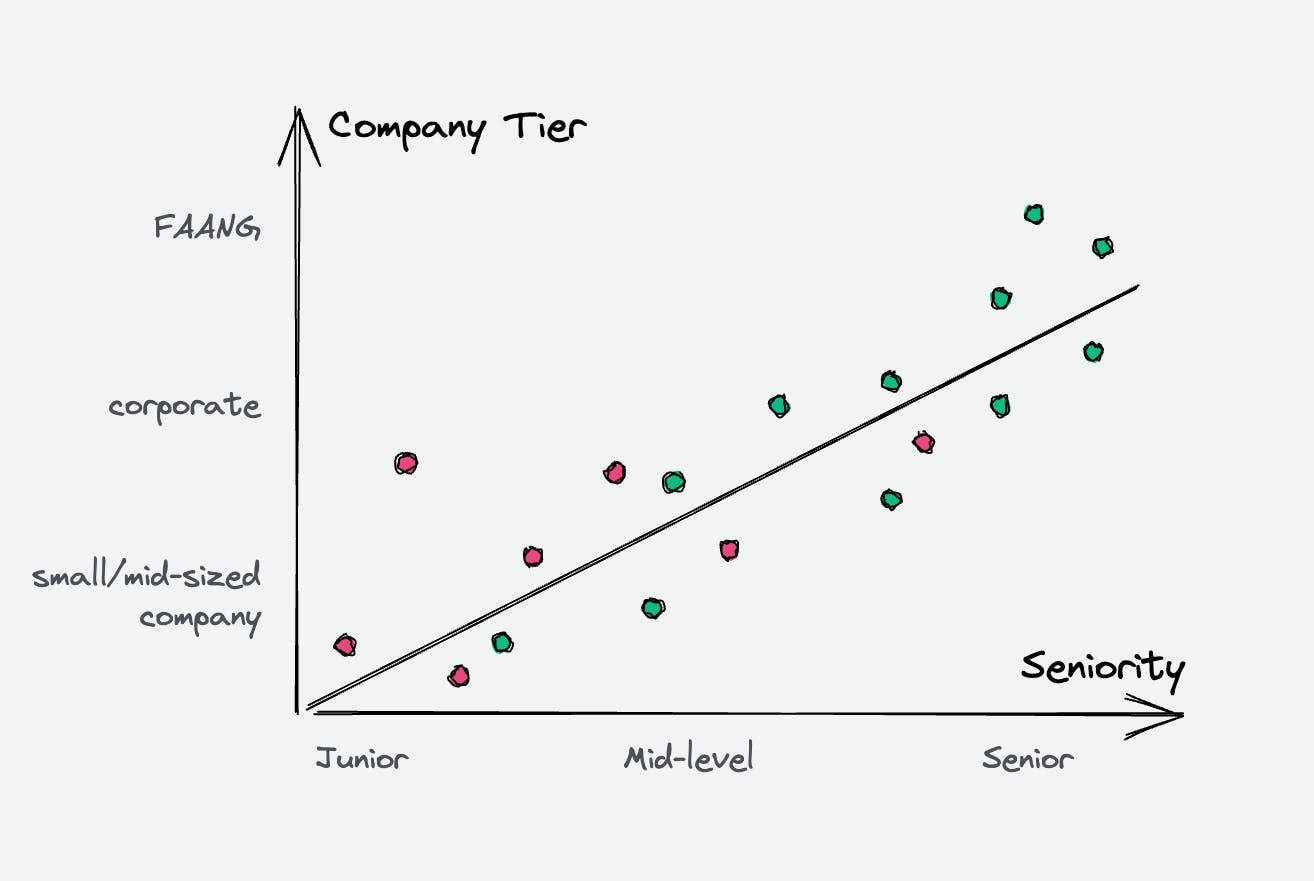
One crucial factor that determines the presence of system design interviews is the seniority level. Typically, as candidates progress to senior positions, the probability of facing system design interviews or related aspects significantly increases. Companies recognize the importance of assessing candidates’ ability to design scalable systems and make crucial architectural decisions as they advance in their careers.
The tier of the company being interviewed also plays a pivotal role in determining the inclusion of structured system design evaluations.
Smaller to mid-sized, local companies are less likely to incorporate structured system design interviews in their hiring process. However, larger corporations tend to prioritize these evaluations to comprehensively assess candidates’ design capabilities. Notably, renowned companies like FAANG (Facebook, Apple, Amazon, Netflix, Google) consistently include system design interviews as part of their rigorous interview process.
To exemplify the relationship between seniority, company tier, and system design interviews, let’s consider two simplified scenarios:
Senior-Level Interview at Google: If you are interviewing at Google as a senior-level candidate, you can expect a system design interview without a doubt. The evaluation will assess your ability to design scalable and efficient systems, align with Google’s high standards.
Entry-level Interview at a Local Company: On the other hand, if you are starting your career and aiming to join a local company, system design evaluations are less likely to be a major focus. As a result, entry-level candidates can concentrate on other aspects of the technical interview process.
Common Types of Questions
As you embark on your system design interview journey, a common question that arises is, “What kinds of interview questions can I expect?”
System design interview questions are known for their broad and unspecific nature, typically taking the form of

The range of potential questions can appear random and diverse, encompassing everything from designing a vending machine to architecting complex systems like Dropbox or even tackling specific components like file synchronization services in platforms like Google Docs.
High-level Design Questions
To bring clarity to this seemingly overwhelming array of questions, let’s categorize them into distinct buckets, helping you better understand and navigate the different types of system design interview challenges that lie ahead.
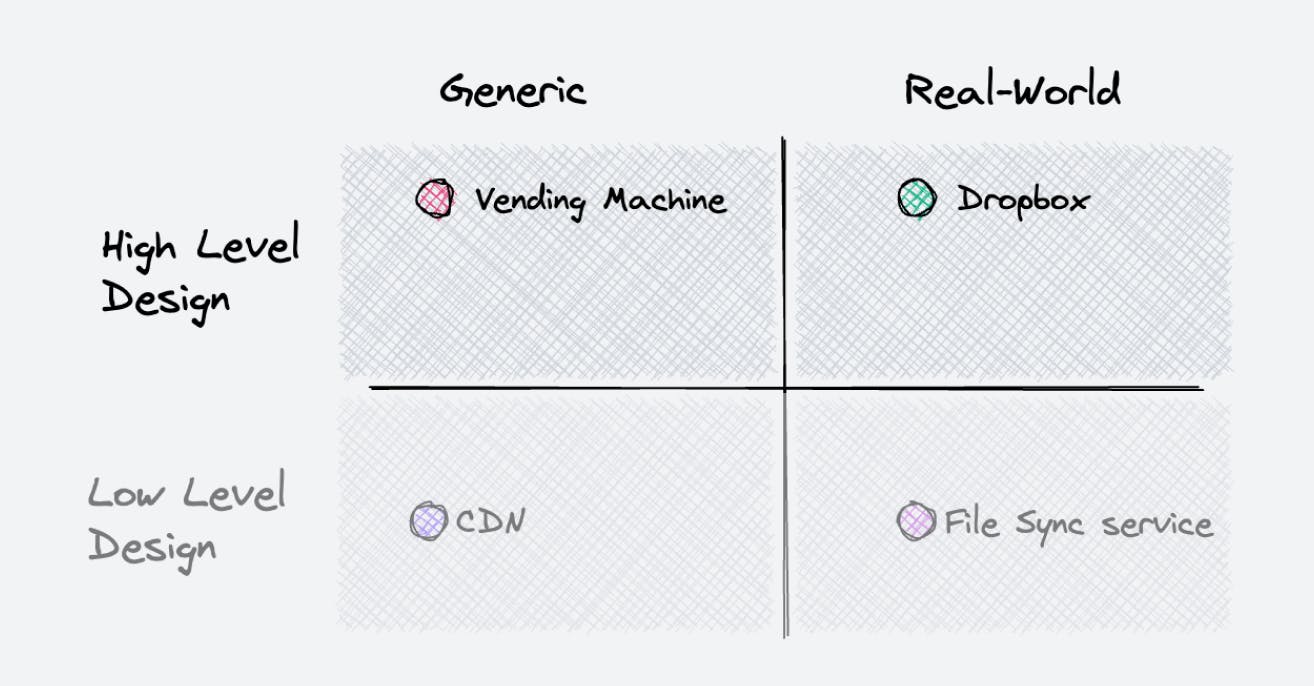
High-level design questions in system design interviews encompass a wide range of scenarios, including designing systems like a vending machine or a real-world application like Dropbox.
The primary focus of the high-level design is to provide an overview of a system's architecture, components, and interactions. Differentiating between generic system questions and real-world system questions is crucial within this category.
Generic system questions primarily assess your ability to identify requirements and constraints and propose a design that fulfils them.
On the other hand, real-world system questions delve into designing large-scale and complex systems, necessitating careful consideration of technical and architectural aspects, as well as user experience. In the following sections, we will explore how to categorize the remaining two types of questions to further enhance our understanding of the system design interview process.
Low-level Design Questions
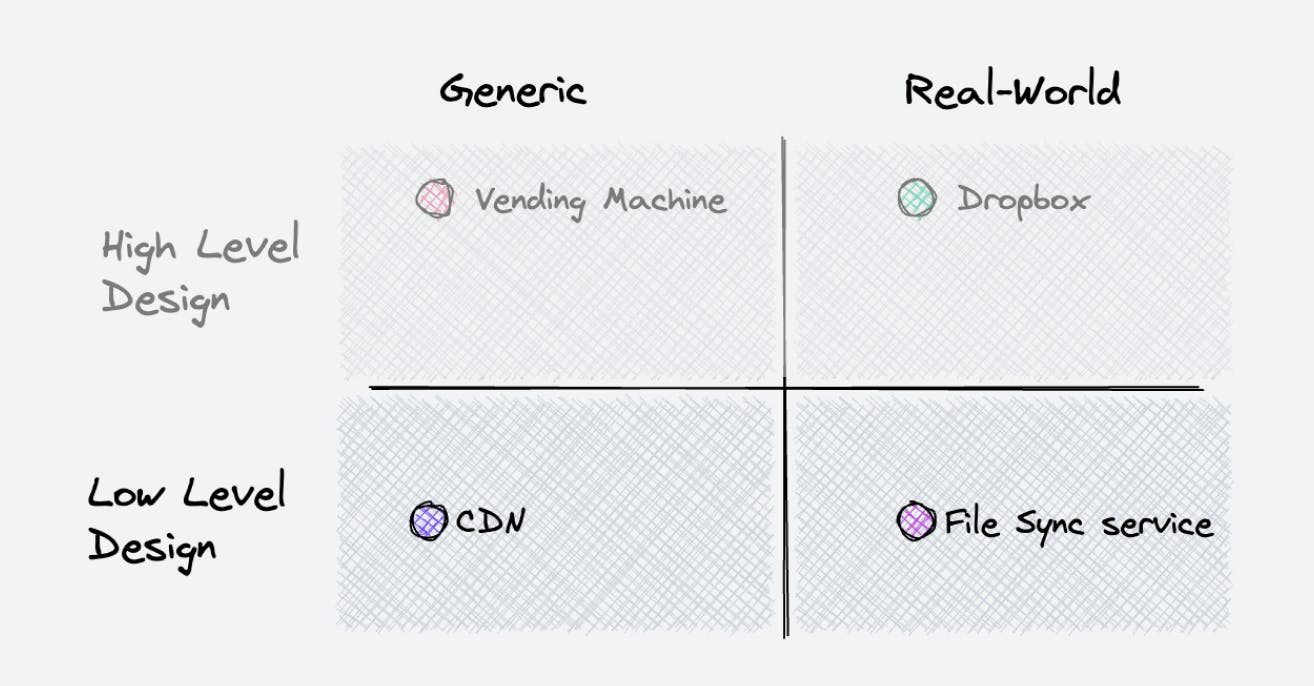
Moving on to low-level design questions, they delve into the detailed implementation of a system, encompassing algorithms, data structures, and interfaces.
Just like high-level design, low-level design questions can be classified into generic and real-world categories. Generic low-level design questions focus on designing intricate system components from scratch, exemplified by the CDN (Content Delivery Network) question.
On the other hand, real-world low-level design questions take a deep dive into specific details of a file sharing system, such as the file synchronization service found in applications like Google Docs. These real-world examples highlight the need for careful consideration of technical intricacies within a broader system.
By understanding the distinctions between high-level and low-level design questions, we gain a holistic view of the various aspects of the system design interview process.
Impact of Seniority on Question Types
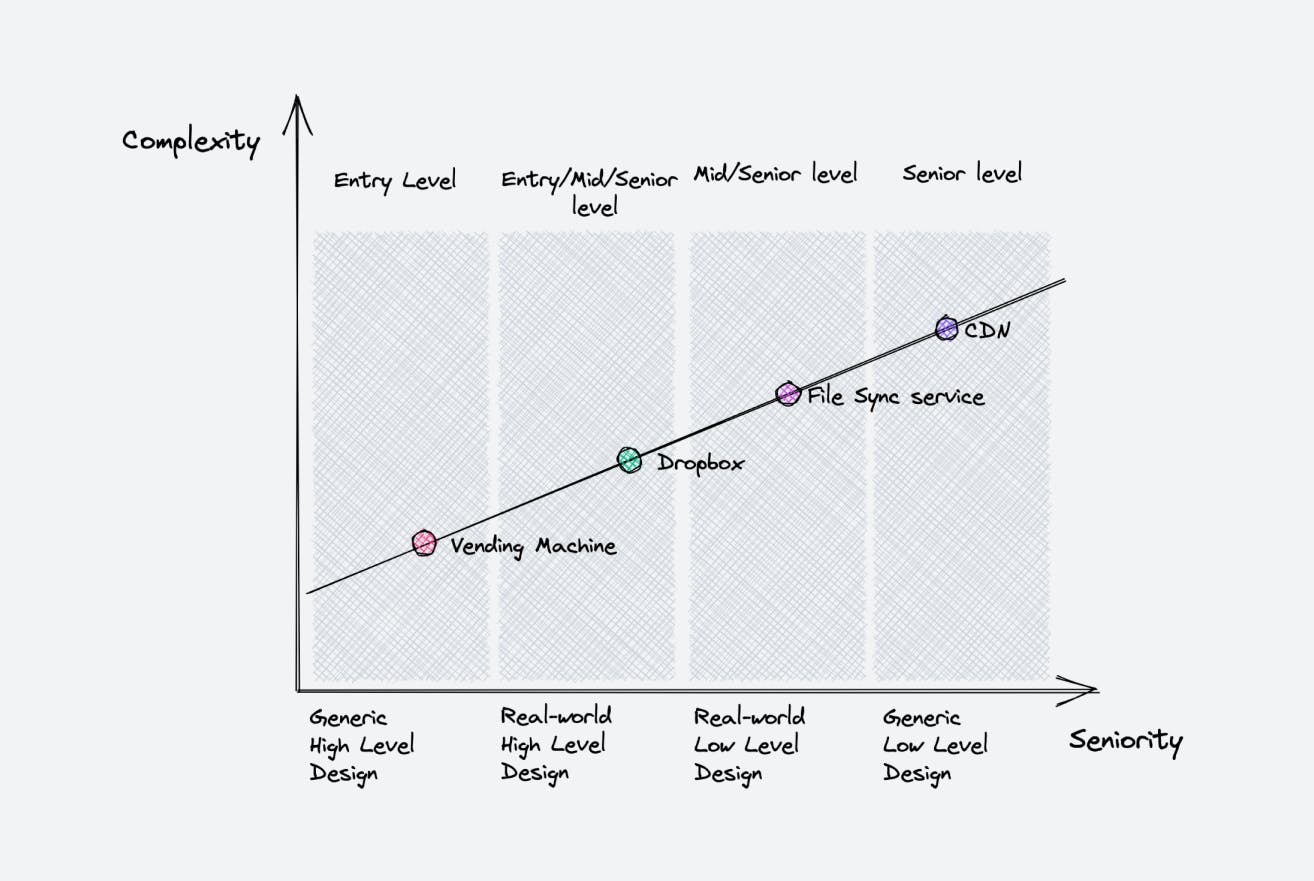
As you navigate the realm of system design interviews, you’ll notice that the level of technical complexity in the questions tends to correlate with your seniority.
For seasoned principal engineers, the likelihood of being asked to design a vending machine is minimal, given their extensive experience.
However, as a junior engineer interviewing with a company that includes system design evaluations for entry-level positions, it’s highly probable that you’ll encounter generic high-level questions.
The most common type of questions revolves around real-world high-level design scenarios, which can be encountered at any level.
However, it’s important to note that what constitutes a good answer is adjusted based on your experience level. While seniority plays a role in the complexity of questions, there are limits to this correlation.
For instance, companies do not pose the most technical questions to applicants e.g. the CTO role, as factors like experience and the specific role also shape the types of questions you can expect in the interview process.
Impact of Role on Question Types

In understanding the technical complexity of system design questions, it’s essential to consider the impact of the roles you apply for. Frontend engineers and roles focused on machine learning or data engineering, in general, are most likely to face both real-world high-level and low-level design questions. Similarly, technical leadership positions such as Engineering Managers and Technical Program Managers can expect a mix of real-world design challenges.
Backend engineers and roles with a strong focus on backend development, such as Distributed System Engineers, are more likely to encounter generic low-level design questions. However, it’s important to note that high-level design questions with a greater emphasis on technical details are not entirely unlikely in these roles.
While role-based expectations play a significant role in determining the nature of system design questions, another crucial factor to consider is the company with which you are interviewing. The specific practices and priorities of the company will further shape the types of questions you can anticipate in your system design interview.
Impact of Company Tier on Question Types
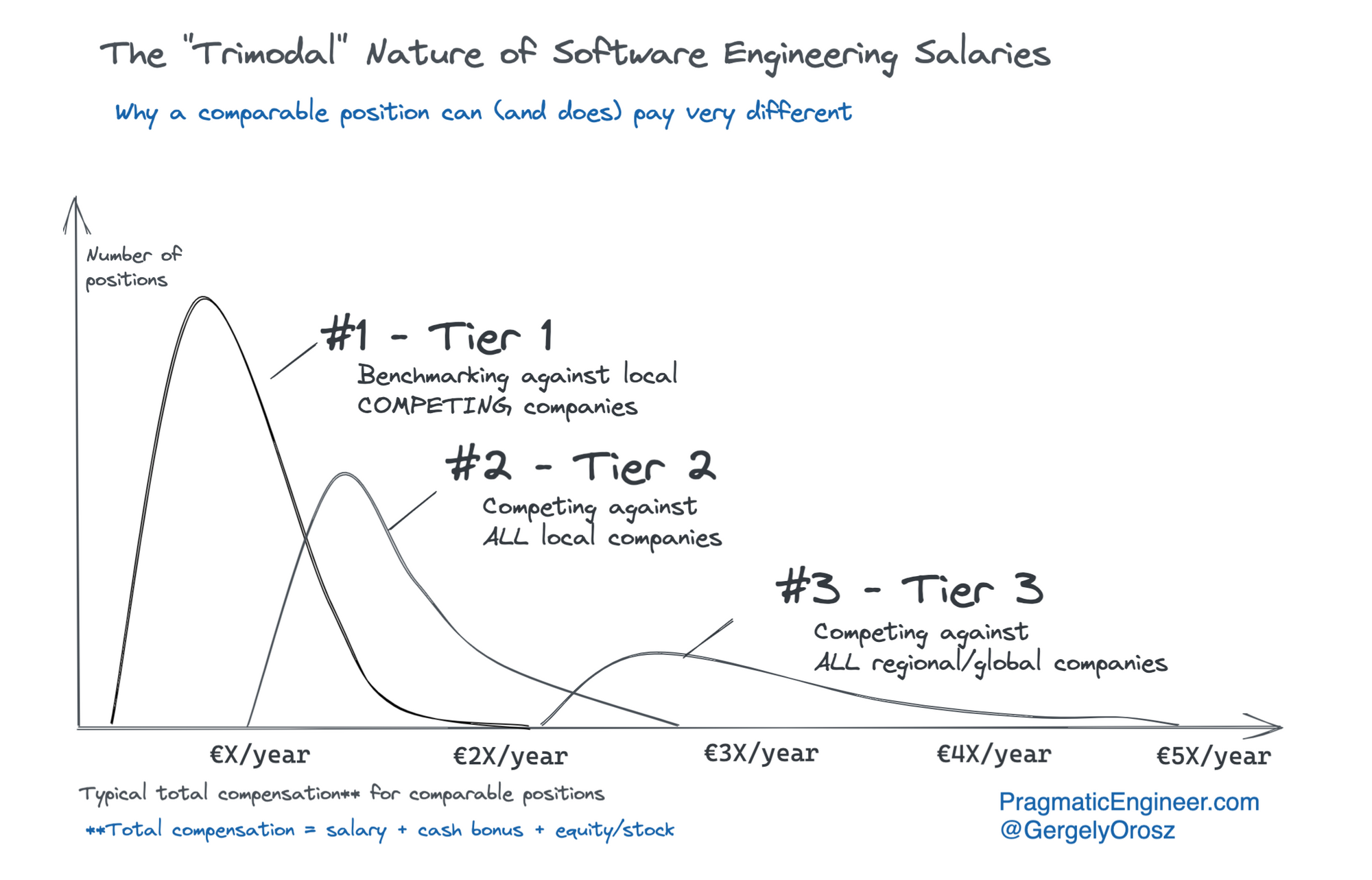
Source: The Pragmatic Engineer
Interestingly, the tier or size of a company does not necessarily dictate the specific types of system design questions asked during interviews. While one might assume that larger, high-profile companies focus solely on complex, real-world scenarios, and smaller companies stick to more generic questions, this is not always the case.
Companies of all sizes and tiers can present a mix of generic, real-world, high-level, and low-level design questions in their interview processes. The diversity of question types highlights the importance of being well-rounded and prepared for a variety of scenarios, regardless of the company’s tier.
Impact of Individual Companies on Question Types

Firstly, they evaluate your system design skills, probing your ability to architect solutions that align with their specific domain. Secondly, they gauge whether you have done your homework and conducted thorough research on the company and its products. Lastly, they assess the degree of transferable knowledge you possess, testing your ability to apply relevant concepts and principles.
To illustrate this further, let’s consider three examples:
Netflix: Expect questions focused on streaming systems, as it is a core aspect of their business.
Amazon: Anticipate inquiries relating to e-commerce or marketplaces, aligning with Amazon’s vast online retail presence.
Google: Interestingly, Google is unlikely to ask questions about ChatGPT, as it is a highly successful product from their competitor. Instead, they may explore other areas where their expertise and products shine.
It becomes evident that preparing for system design interviews requires a tailored strategy.
In conclusion, mastering system design interviews is a crucial step for software engineers aiming to excel in the technical interview process. This article has provided a comprehensive understanding of system design interviews, covering topics such as high-level and low-level design questions, the impact of seniority, company tier, and role on question types, and how individual companies align questions with their product range. Recognizing the importance of tailored preparation strategies, we are excited to offer a lead magnet in the form of a quiz.
I put together an interactive quiz incorporates all the knowledge shared in this article, taking into account your unique profile, including seniority, role, and the companies you are applying to. By answering 3–4 questions questions, the quiz will generate a customized system interview preparation strategy specifically designed for you.

👉 Take the quiz to find out if the system interview applies for you.
This personalized approach ensures that you are equipped with the most relevant knowledge and insights, maximizing your chances of success in system design interviews.
Ready to take your preparation to the next level? Click the link below to access the quiz and unlock your personalized system interview strategy. Don't miss out on this opportunity to enhance your interview performance and pave the way to your dream career in the tech industry. Let's embark on this journey together and conquer system design interviews with confidence.

Follow me on Twitter for daily inspiration and helpful resources as we navigate the world of tech together. You can also find me on LinkedIn, where I share firsthand experiences and career advice from my journey in big tech. More on system design and interview prep you find on Youtube and my blog — bigtech.coach

